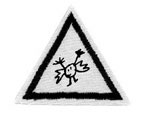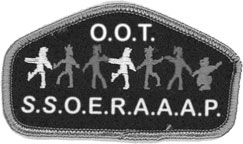Score another point for my mother.
My mother is a really good cook. She is also an unrepentant violator of recipes. My earliest cookbook related memory involves noticing that, while Mom had a recipe in front of her, she was flagrantly measuring different amounts of ingredients than those called for, and combining them in a way that clearly contravened the method described on the page.
It turns out that this manifestation of her issues with authority may also explain why she has such a good understanding of what she’s doing in the kitchen.
At least, that’s a conclusion I’m inclined to draw from research done by Ohio State University professor Steve Rissing on two different approaches to an enzyme laboratory experiment in an introductory biology course:
Author Archives: admin
Dramatists and scientists have something in common.
Yesterday, while transporting the sprogs to Science Scouts aquatic training maneuvers, I caught a few minutes of a City Arts & Lectures interview with Lewis Black. In the part of the interview I heard, Black discussed his efforts (over the course of eight years) to make it as a playwright, and he revealed a couple ways in which that career path might not be so different from that of the scientist:
Friday Sprog Blogging: combustion
 Both Free-Ride offspring are charter members of the Order of the Science Scouts Special Children’s Auxiliary. They have not, as yet, built their own fire, either in a fire pit or a laboratory. However, a discussion this week about the strange vapor seen emanating from a car’s tailpipe one morning moves them further in the direction of being O.O.T.S.S.O.E.R.A.A.A.P. fire-certified.
Both Free-Ride offspring are charter members of the Order of the Science Scouts Special Children’s Auxiliary. They have not, as yet, built their own fire, either in a fire pit or a laboratory. However, a discussion this week about the strange vapor seen emanating from a car’s tailpipe one morning moves them further in the direction of being O.O.T.S.S.O.E.R.A.A.A.P. fire-certified.
Non-Hallmark sponsored Valentine’s Day bullets of pure love.
Yes, Valentine’s Day is in the top three Hallmark holidays of the year. No, it is not a holiday actually created by Hallmark, despite what half a dozen people have independently asserted to me in the last 48 hours. I am appalled that the commercialization of this holiday has people keeping score on who loves the most (and who is most loved) on the basis of overpriced flowers, jewelry, and chocolate.*
The rampant commercialism of the day notwithstanding, this seems like as good a time as any to share some love:
We don’t need no stinkin’ badges!
 Scientists move through the world without needing badges to indicate their various achievements.
Scientists move through the world without needing badges to indicate their various achievements.
This does not mean, however, that scientists might not want badges. If scientists all wore sashes of badges over their lab coats, it might well facilitate communication by letting them determine the relevant interests and experience of the other scientists with who they are talking. Badges would also provide a natural opening with which scientists could share their best stories with each other. (“What did you freeze?”)
Badges also help a scientist stay nimble with a needle and thread.
Below are the Science Scouts badges I have earned, so far. Each is linked to its Scout Handbook description. Questions about how I may have earned particular badges will be entertained in the comments.
Basic concepts: elements.
I figured it was time I weighed in on a basic concept from chemistry, so let’s talk about what defines an element.
What do scientists mean by ‘theory’?
In my basic concepts post on theory testing, I set out what I take to be a fairly standard understanding of “theory” in philosophy of science discussions:
Friday Sprog Blogging: Australian fauna.
Last weekend, the sprogs and I were delighted to attend a late Australia Day/early Darwin Day party. Our hosts apologized for “not having much interesting kid-stuff” on hand. Little did they suspect that the abundance of cookies (not just ANZAC cookies, but rolled ginger and lemon cookies in the shapes of kangaroos and giant Galapagos tortoises), and of cute stuffed animals native to Australia, and of art supplies, would keep the Free-Ride offspring more than happy.
Words that strike fear into the hearts of faculty members.
Uttered by my dean as an intense, two hour long committee meeting was adjourning:
“There’s a lot of untapped administrative talent in this room.”
Help!
The best graduate (chemistry) writing assignment ever.
As part of my graduate coursework in chemistry, I took a biophysical chemistry course from Professor Wray Huestis — not because my research was in biophysical chemistry, but because I was curious. Possibly my best move ever in choosing my classes, since she gave us one of the smartest and most useful writing assignments I’ve ever encountered.
